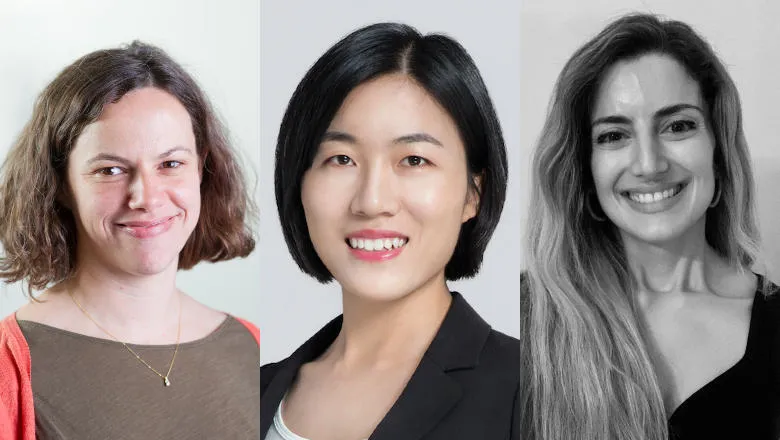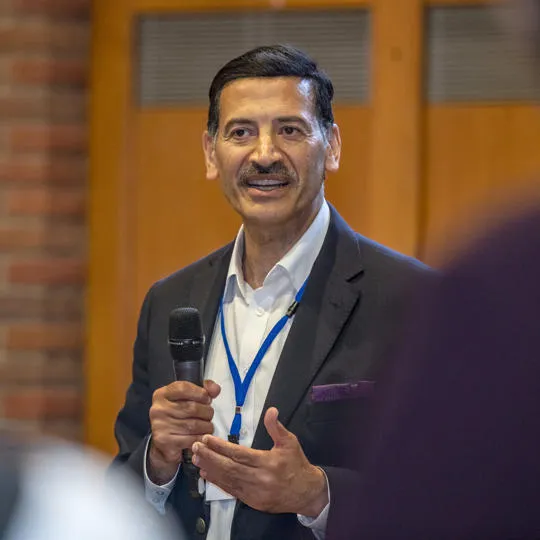It is wonderful to see our partnership with the Turing Institute strengthened through these fellowships. This is testament to the impactful research the recipients are carrying out, and I look forward to the engagement opportunities they will generate across the UK and global AI and data science landscape.
Professor Bashir M. Al-Hashimi, Vice President (Research & Innovation), King’s College London
01 March 2024
King's AI researchers appointed as Turing Fellows to tackle societal challenges
Three King's academics from the Department of Informatics have been named as Turing Fellows for 2024-25

Announced today, King’s Dr Elizabeth Black, Dr Yali Du and Dr Helen Yannakoudakis are amongst the 51 new Turing Fellows appointed by The Alan Turing Institute – the UK’s national institute for data science and artificial intelligence. The two-year fellowships start on Friday 1 March 2024.
The Turing Fellowship Scheme aims to grow the data science and AI ecosystem in the UK by supporting, retaining and developing the careers of the next generation of world leading researchers, whilst contributing to the Institute’s overarching goals.
The new Turing Fellowship model is aimed at established researchers whose research interests align with the Turing’s Science and Innovation priorities outlined in the Institute Strategy.
As well as taking part in the Turing’s interdisciplinary, and collaborative research community, the new fellows will also support work in the areas of skills and public engagement.
The Turing Fellows were appointed through an open call which is anticipated to run on an annual basis. Future calls will be aligned closely to the Institute’s goals.
Professor Mark Girolami, Chief Scientist at the Turing, said:
'I’m delighted to welcome a new cohort of Turing Fellows, brought to us from across our University Network in recognition of their status as the next generation of world leading researchers in the data sciences, AI and related fields. I’m very much looking forward to seeing the immense value they will add to our diverse and vibrant science and innovation community, including playing a critical role in the delivery the Turing’s strategy as we strive to change the world for the better through data science and AI.'
Dr Elizabeth Black is a Reader in Artificial Intelligence in the Department of Informatics, where she is a member of the Reasoning and Planning research group. She is also the Director of the UKRI Centre for Doctoral Training in Safe and Trusted Artificial Intelligence, focussed on the use of model-based artificial intelligence techniques for ensuring the safety and trustworthiness of AI systems. She comments on her appointment:
'I’m really excited to join the Turing community to help shape national policy around AI skills development under the Turing’s ‘Build Skills for the Future’ priority area. We need a radical shift in our approach to training AI experts, who need a holistic understanding of both the technical AI challenges and the societal implications of AI, and need cross-disciplinary capabilities to ensure AI impacts are positive, safe, sustainable and empowering.'
Dr Yali Du is a Lecturer in Artificial Intelligence in the Department of Informatics and she leads the Cooperative AI Lab. Her research aims to enable machines to exhibit cooperative and responsible behaviour in intelligent decision making tasks.
'Being selected as a Turing Fellow is both an immense honour and a profound responsibility. This fellowship represents a unique opportunity to delve into complex AI challenges, collaborate with leading minds in technology and research, and contribute to groundbreaking advancements. I look forward to embracing the collaborative spirit of The Alan Turing Institute, pushing the boundaries of what's possible through innovation, and driving forward the frontiers of knowledge in our field.'
Dr Yali Du, Lecturer in Artificial Intelligence
Dr Helen Yannakoudakis, Lecturer in Natural Language Processing in the Department of Informatics, is the third King's academic to be appointed Turing Fellow for the upcoming year. She works on machine learning for natural language processing and says:
'This is an amazing opportunity to work with leading experts in the field on reliable, safe and trustworthy AI solutions, and form interdisciplinary collaborations that can help to redefine the boundaries of our current knowledge and disciplines. The fellowship will also enable me to participate in existing EDI efforts, which are pivotal to the future of AI and beyond, driving and accelerating innovation and creativity, and acting as a catalyst for ideation from diverse viewpoints.'
King’s is proud to be a member of the Turing University Network, supporting the Institute to achieve its three ambitious goals: advance world-class research and apply it to national and global challenges, build skills for the future, and drive an informed public conversation. Find out more about King’s partnership with the Turing on our website or by contacting Dr Catherine Healy, Turing Partnership Manager.




